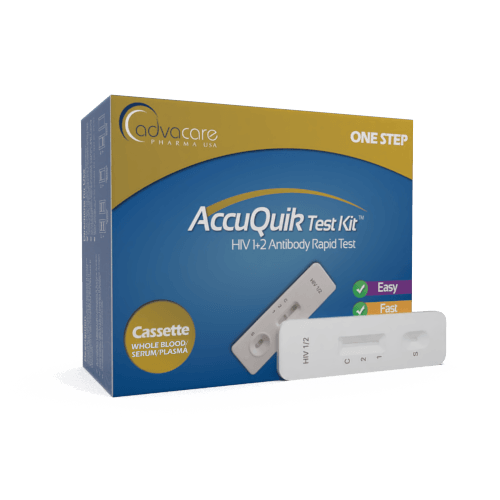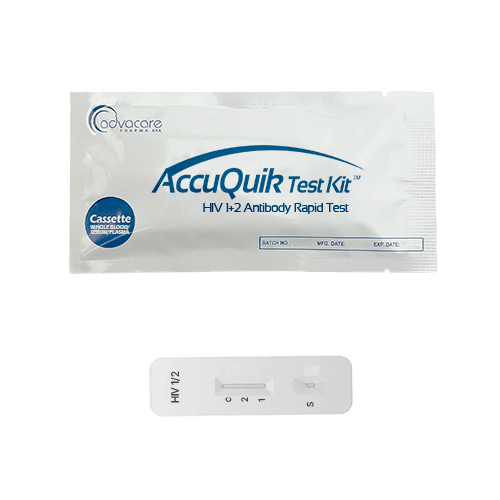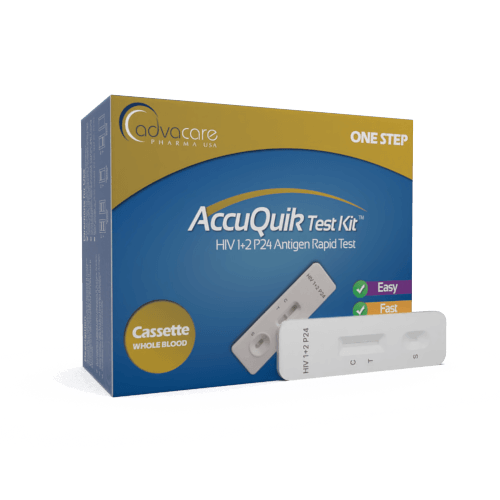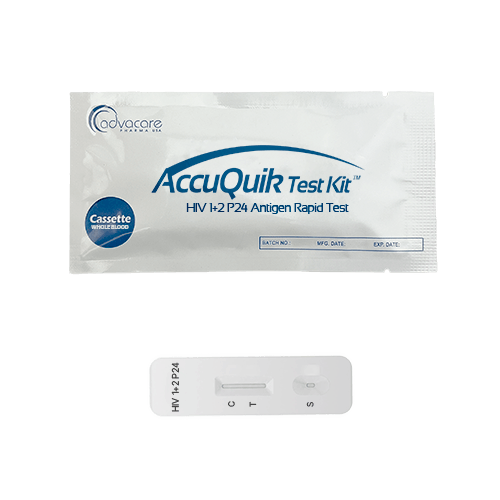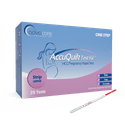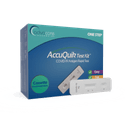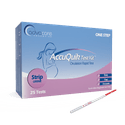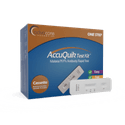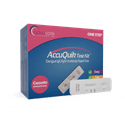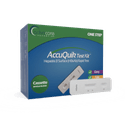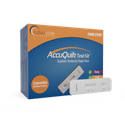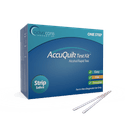- Home›
- Medical Devices›
- Diagnostic Detection Devices›
- Rapid Test Kits (RDT)›
- HIV Test Kits
HIV Test Kits
Type
Specimen
Form
Packaging
What are HIV Test Kits?
HIV Test Kits are medical diagnostic tools that can detect the presence of antibodies or antigens due to the human immunodeficiency virus (HIV). These HIV rapid test kits can detect an infection in less time than traditional laboratory testing, leading to a quicker diagnosis and reducing the spread of the virus.
HIV antibody test kits and HIV antigen test kits require minimal training to operate and are one-time-use. Results are available within 15-20 minutes, and the HIV rapid test kit can be easily interpreted, which makes them ideal for point-of-care use or home use.
Both the HIV 1+2 antibody test kit and the HIV 1+2 P24 antigen test kit are based on lateral-flow immunoassay technology.
AdvaCare Pharma is the supplier of HIV Test Kits, which are manufactured in ISO and CE-certified facilities in India, China, and the USA. Every facility is regularly inspected to ensure they are compliant with healthcare standards for quality and safety.
Product Specifications
Type
Specimen
Form
HIV 1+2 Antibody Test Kit
HIV 1+2 Antibody Test Kit is used for the qualitative detection of antibodies to HIV 1 and 2 in a specimen of whole blood/serum/plasma, urine, or saliva.
The HIV 1+2 antibody test kit is available as either a cassette or a strip. The test utilizes immunochromatography to rapidly provide accurate and reliable results. Results are indicated by a positive, negative, or invalid reading.
HIV 1+2 P24 Antigen Test Kit
HIV 1+2 P24 Antigen Test Kit is a qualitative assessment tool used for the detection of HIV-1 and HIV-2 antibodies, as well as the p24 antigen, in whole blood specimens.
The HIV 1+2 P24 antigen test kit utilizes a cassette format for convenient and rapid results. The specimen reacts with the reagents present on the test device, and the appearance of a visual signal indicates the presence or absence of HIV antibodies and p24 antigen.
Whole Blood
Whole Blood specimen may be used for this type of HIV test kit. To obtain a whole blood specimen, blood can be collected either through standard venipuncture with 2 drops or through fingerstick using a 50 μL technique. The collected blood is then transferred to the designated area of the cassette using a capillary tube or dropper. Following the transfer, a drop of the corresponding buffer dilution is promptly added to the cassette to initiate the test procedure.
Whole Blood/Serum/Plasma
Whole Blood/Serum/Plasma specimens may be used for this type of HIV test kit. To collect a specimen of whole blood, serum, or plasma, standard venipuncture or fingerstick techniques can be employed, with 2 drops or 50 μL of the blood being collected. In the case of serum or plasma samples, centrifugation may be required before transferring the specimen using a capillary tube or dropper to the designated area of the cassette. Following the transfer, a drop of the corresponding buffer dilution is added to the cassette.
Urine
Urine specimens can be collected at any time using a clean and dry container. There are no specific timing requirements for urine collection, which allows for more flexibility in the sampling process. It is important to ensure the container is free from contaminants and properly sealed afterward to prevent leakage, as it helps maintain the integrity of the sample and ensures accurate test results.
Saliva
Saliva specimens can be collected using a swab to gather cells from the mouth. The swab has a long, thin plastic handle with an absorbent tip that collects fluid from the tongue and inner cheeks. The swabs are individually packaged in sterile blister packs to maintain sterility.
After the sample is collected, the swab is immediately placed in a buffer dilution to prepare it for the subsequent testing process. This method ensures the integrity of the saliva sample and allows for accurate test results.
Cassette
Cassette is comprised of a plastic enclosure housing a test strip. It features a designated area for the placement of the sample and windows where the test result lines will be visible, indicating a positive, negative, or invalid result.
The cassette's structure provides a secure and controlled environment for the test strip, ensuring accurate and reliable results.
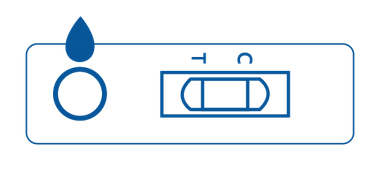
Strip
Strip is designed with a reaction pad to provide accurate and clear result interpretation.
To use the strip, administer the specimen sample onto the designated arrow end of the strip. The strip is designed with a reaction pad where the lines indicating a positive, negative, or invalid result will appear.

Why are we a leading HIV Test Kits manufacturer?
AdvaCare Pharma specializes in manufacturing HIV Test Kits and other high-quality and competitively priced rapid test kits. To ensure the quality of our rapid diagnostic tests, we adhere to stringent CE and ISO guidelines at our manufacturing factories.
For over 20 years, AdvaCare Pharma has built a reputation as a dependable supplier of HIV Test Kits and other diagnostic tools. We are proud to collaborate with distributors, hospitals, pharmacies, NGOs, government institutions, and many other institutions in over 45 markets across the world.
Uses
What are HIV Test Kits used for?
HIV Test Kits serve as great diagnostic tools to identify the presence of antibodies or antigens related to the human immunodeficiency virus (HIV). These kits enable the detection of HIV infections quickly and conveniently, allowing for timely intervention and management.
By detecting HIV antibodies or antigens, these kits aid in diagnosing HIV infections in individuals who may be asymptomatic or show vague symptoms. Early diagnosis is key in preventing the progression of HIV to more advanced stages and reducing the risk of transmission to others. HIV Test Kits are widely utilized in various healthcare settings, including clinics, hospitals, community health centers, and outreach programs, to facilitate widespread screening and improve access to HIV testing.
How are HIV Test Kits used?
HIV rapid diagnostic tests are user-friendly and can be administered with minimal training. The specific procedure for using these kits varies depending on the type of sample required, such as whole blood, serum, plasma, urine, or saliva. The process involves collecting the appropriate specimen, such as a blood sample obtained through venipuncture or fingerstick, or a urine or saliva sample collected using sterile techniques. The collected specimen is then applied to the designated area of the test kit, either a cassette or strip, following the instructions provided in the packaging.
After the application of the specimen, a buffer solution may be added to initiate the test reaction. Within a short period of 10 to 20 minutes, the results become visible, indicating whether antibodies or antigens related to HIV are present in the specimen. Interpretation of the results is straightforward, with distinct markings indicating a positive, negative, or invalid result.
How should unused HIV Test Kits be stored?
Proper storage of unused HIV Test Kits is necessary to maintain their efficacy and reliability. These kits should be stored in a dark, dry, and cool environment to prevent exposure to light, heat, and humidity, which may compromise the integrity of the test components. Store the kits away from direct sunlight and sources of heat to avoid any damage to the materials.
Adherence to a first-in, first-out (FIFO) approach is recommended to guarantee that the test kits with the nearest expiration dates are used first, minimizing the risk of using expired kits. Any damaged or expired test kits should be promptly discarded following appropriate disposal guidelines.
How should HIV Test Kits be disposed of?
Disposal of HIV Test Kits should be conducted in compliance with local regulations and guidelines for the safe handling and disposal of biohazardous waste. After use, any used test components, including the specimen collection materials and test devices, should be sealed tightly in a leak-proof and puncture-proof container designated for biohazardous waste disposal. This is vital to prevent any potential contamination or exposure to bodily fluids during disposal. Healthcare facilities and testing sites should have established protocols for the proper disposal of HIV Test Kits, guaranteeing the safety of personnel and the environment.
Disposal methods may vary depending on regional regulations, but adherence to standard precautions and infection control measures is paramount to prevent the spread of infectious agents and protect public health.
How should healthcare professionals handle potential exposure to HIV while administering HIV test kits?
Healthcare professionals working in medical environments should follow strict safety protocols to minimize the risk of exposure to HIV and other bloodborne pathogens during the administration of HIV test kits. This includes wearing appropriate personal protective equipment (PPE), such as gloves, masks, and goggles, when handling blood or bodily fluids. In the event of accidental exposure to needlesticks, or contact with contaminated surfaces, healthcare professionals should immediately wash the affected area with soap and water, followed by reporting the incident to their supervisor or occupational health department for further evaluation and management.
Post-exposure prophylaxis (PEP) may be recommended in certain situations to reduce the risk of HIV transmission. Healthcare facilities must have policies in place for the safe disposal of used test kits and contaminated materials to prevent accidental exposure and minimize the spread of infection. Regular training and education on infection control practices are required for healthcare professionals to protect them and their patients.
FAQs
How does an HIV Test Kit work?
The HIV test kits are rapid immunochromatographic tests, which give a simple visual interpretation of the presence or absence of antigens or antibodies to HIV 1 or 2.
What is the difference between the HIV 1+2 Antibody Test Kit and the HIV 1+2 P24 Antigen Test Kit?
The HIV 1+2 antibody test kit can detect antibodies that are produced by the body in response to the HIV virus, while the HIV 1+2 P24 antigen test kit is able to detect the p24 antigen of the HIV virus, which is typically detectable earlier than antibodies.
Who should be tested with HIV Test Kits?
The World Health Organization recommends that individuals between 13 and 64 are offered yearly routine HIV testing. Pregnant women should be tested early in their pregnancy. Those who have unprotected sex with multiple partners, share needles, or engage in other high-risk behaviors should also be tested. Moreover, individuals who have been sexually assaulted or have a sexually transmitted infection may also benefit from HIV testing.
How long does it take for an HIV Test Kit to display the results?
Results are readable within 10 to 20 minutes.
How do you ensure the quality of your HIV Test Kit?
We adhere to strict quality assurance processes throughout the design, manufacturing and distribution of our medical devices, including but not limited to CE, ISO and/or USFDA certifications, to ensure they meet the highest standards of quality and safety.
What complexities are involved in importing Class II medical devices for distribution?
Importing Class II medical devices may involve more regulatory oversight than Class I devices; however, with proper documentation and compliance, they can still be imported for distribution. Our Regulatory Affairs Department provides expert assistance to ensure efficient registration in the target country.
Do you offer regulatory support for importing your HIV Test Kit?
Yes, we provide regulatory support and assistance to our distributors to ensure compliance with local regulations and facilitate the importation of our medical devices. Our competence in product registration is supported by our highly capable Regulatory Affairs Department which includes pharmacists, biomedical engineers, QA professionals and documentation specialists.
Can I distribute your HIV Test Kit in hospitals, clinics and other medical institutions?
Yes, our medical devices are designed for distribution in a variety of healthcare settings, including hospitals, clinics, pharmacies, and other medical institutions. Our straightforward distributor verification process makes it convenient to start distributing our products. For more details on distributing our medical devices in your area, reach out to our International Sales Department.
References
A Global Review of HIV Self-testing: Themes and Implications
This study reviews the acceptability, feasibility, and effectiveness of HIV self-testing (HST) around the world. It found that HST has the potential to increase testing rates and reduce HIV-related incidence and mortality. The study also found that HST is generally performed correctly, is accepted by participants if available at a relatively low cost, and is preferred over blood-based tests. However, the study also found that some participants made procedural errors and requested additional help beyond a finger-prick-based HIVST kit.

You might be interested in...
Why AdvaCare Pharma?
As an industry leader, we are aware of our responsibility to provide affordable and sustainable solutions to improve healthcare worldwide.
